Next time you’re in church, count the number of adult heads and divide by the number of pairs of pantyhose. If the pantyhose contingent makes up more than half the total, there’s a word for your church: typical.
“Every sociologist, and indeed every observer, who has looked at the question has found that women are more religious than men,” writes Leon Podles in his new book, The Church Impotent. (Ouch; the stentorian title makes me wince. Once inside, however, it’s reasonable and well-written.) Podles cites a deluge of statistics: in 1986, church-growth expert Lyle Schaller observed 60 percent female to 40 percent male churchgoers, a split that has widened since. Jesuit theologian Patrick Arnold says he has found a female-to-male ratio ranging from 2:1 to 7:1, and “some liberal Presbyterian or Methodist congregations are practically bereft of men.” Even in churches that have an all-male ordained leadership, the inner circle of laity who actually run things is likely to be mostly female. Sociologist Edward H. Thompson states that “throughout all varieties of black religious activity, women represent from 75 to 90 percent of the participants.” These are observations based on attendance, but the last time a census of membership by gender took place was 1936. Even back then, women outnumbered men across denominations, with Pentecostals almost 2 to 1.
On the one hand, these figures are good news. The faith that raised the status of women in the ancient world still raises their spirits today, and it’s hard for anti-Christian snipers to claim that Christianity is antiwomen when women fill pews so enthusiastically. As John Updike wrote in a recent issue of the New Yorker: “It is not Christianity that in parts of Africa promotes clitoridectomy as a means to properly shaped femininity. It is not Christianity that inflicts upon women, as in Iran and Afghanistan, hysterical restrictions that inhibit their access to employment, education, social life, and even medical care.”
But why aren’t men there in equal numbers? It’s not quite accurate to say men aren’t as interested in religion, since they participate strongly in Islam and Judaism. Podles suggests that Christian congregations outside Western Europe and America enjoy better balance, and cites the Polish Solidarity workers who boldly displayed their faith. But somewhere along the line, Western Christian faith lost some of its manly appeal.
The Norman Rockwell painting Easter Morning depicts the problem: Dad slouches in his pajamas, awash in newspapers, while Mom and the kids march past him in their Sunday best. A hundred years before that, clergy were already being stigmatized as prissy and effeminate. In the late seventeenth century, Cot ton Mather complained that only women came to church. Following the evidence back through history, Podles arrives at the thirteenth century, when Saint Bernard of Clairvaux developed a mysticism based on imagining oneself the Bride of Christ.
Where Saint Paul had described a bridal role for the entire church, the nuptial bond was now imagined as me-and-Jesus alone, and as swooning and passionate. Women, then enjoying a period of in creased freedom, popularized this approach, but men found it harder to imagine themselves in Jesus’ arms. Yet the notion took hold, persisting through the centuries: even stern Cotton Mather taught that Jesus marries each individual believer, and Promise Keepers’ Bill McCartney said we should “be in a love affair with Jesus.” Passive receptiveness sup planted sacrificial obedience as the model for all Christians—a passivity many men found emasculating. Perhaps in reaction they retreated into ever-dryer forms of scholasticism, and so theology became divorced from devotion.
Men still feel the need for transcendent meaning, Podles says, but if the only faith they see is soft and sappy, they’ll seek it elsewhere: through career power, competitive sports, or, when particularly belittled or hopeless, through violence, drugs, and danger. As they slipped out the back door, more seats were occupied by women. In the fourteenth century, the rate of saints canonized that were women rose from 50 percent to 71 percent, and the remaining male saints were not laymen but monks and clerics.
The statistics above suggest the gap is widening, perhaps accelerated by the context of consumerism. Advertising leads us to think of our desires as important and precious things. We expect to be wooed. We assume that God’s relationship with us is based on his desire to console and reassure us, rather than our desperate need to be rescued from sin and conformed to his holiness. But throughout the New Testament, and for a millennium, the gospel message of consolation was matched by “masculine” calls to strive like an athlete and to lay aside sin.
Perhaps the church’s message needs to be gender adjusted. We can try changing the sign in front of the church from “We Care About You!” to “Faith Demands Things of You!” Then be prepared to include a choir budget item: you’ll need more music stands for the basses.
Copyright © 1999 Christianity Today. Click for reprint information.










